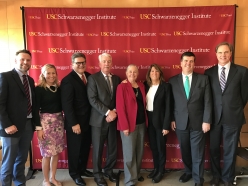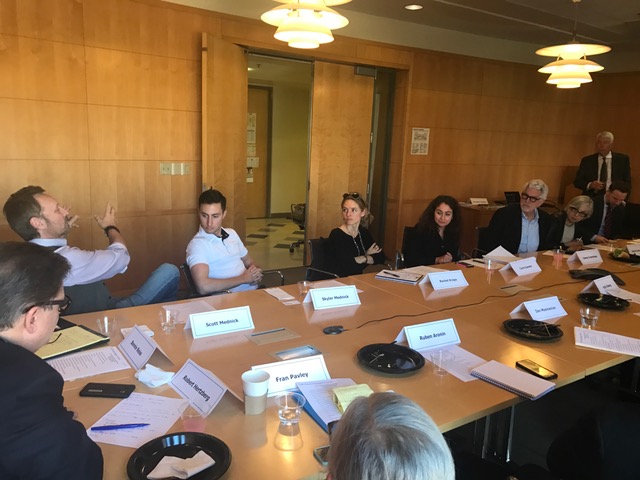The Schwarzenegger Institute in partnership with Pure Earth hosted a roundtable briefing featuring the latest work of the Global Commission on Pollution and Health , which consists of some of the world’s pre-eminent thought-leaders in environmental science and health, economics and global development.
Dr. Philip Landrigan, Dean for Global Health at Mt Sinai, and Richard Fuller, President of Pure Earth, shared highlights of a soon to be released report on pollution’s severe and underreported contribution to the global burden of disease. The report will show that pollution is the leading cause of death in the world, killing 9 million people, more people annually than HIV, malaria and tobacco combined. (Note: the report is embargoed until published in The Lancet, and Institute will provide a link to report when released).
The report also examines the economic costs of pollution, estimated at over $4 trillion annually, and compares the costs of inaction to the costs of available solutions. The report also provides a list of solutions as well as best practices from a number of pilot programs currently being used to clean up some of the most toxic sites in under developed regions throughout the world.
Following Dr. Landrigan and Mr. Fuller’s briefing on the report, leaders participating in the roundtable, were asked for feedback on how to present the findings in the most impactful way to support action on the solutions being piloted.
State Senator Robert Hertzberg, advised Fuller and Landrigan to remember, that when approaching government leaders, that they need to make their case as relevant to their constituents and compelling as possible as legislators, like him, receive a large number of requests to engage on a wide variety of impactful issues. Senator Hertzberg also stressed that all politics are local and suggested that Fuller and Landrigan develop an action plan that allows them to provide best practices and organizational support learned in a few, targeted “hot spots” to regions that are for the most part under resourced and in need of the strategic and organizational support that Pure Earth can provide.
Former State Senator Fran Pavley felt that the work the Global Commission on Pollution and Health is doing globally is relevant to policy makers in the United States and suggested that Fuller and Landrigan find ways to draw stronger connections between the two. Pavley stressed that although the United States is a wealthy nation, there are pockets of poverty that are still grappling with pollution. Senator Pavley cited Flint, Michigan as a prime example.
CAA Foundation Director Rachel Kropa and filmmaker Scott Mednick both said how important it is to “tell a compelling story” when talking about the relationship between pollution and health. They acknowledged the importance of data and research but added that both rarely motivate people to act on their own.
The Institute looks forward to continuing our collaboration with the Global Commission on Pollution and continuing to work with Richard Fuller and Philip Landrigan on finding solutions to the adverse health effects of global pollution.


